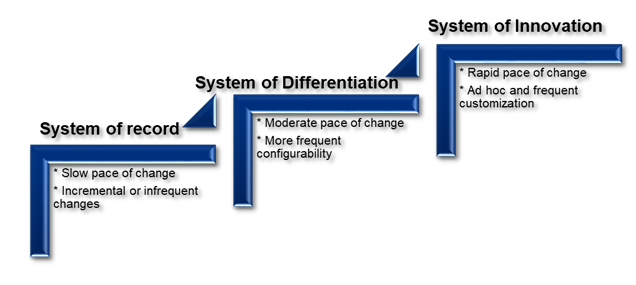How can we help you?
Dive into our knowledge
How to choose your next (tractor) business application platform
Well, it’s easy isn’t it? Write down what you want and then see what best fits. Done.

Perhaps not.
But isn’t that the way we choose anything in life? We work out the criteria and use that it as a checklist to get the closest possible match. We work out the compromises we are and aren’t willing to make and then select the best (or maybe least worst). But what happens when all your choices tick all the boxes? How do you then differentiate?
If you’ve read previous blogs of mine, you’ll know that I’m from a farming background, and we have this problem all the time when selecting a tractor. As you can imagine, tractors are mostly the same. They have the same power, same attachments etc. So, when something is a commodity how do you choose?
In the case of tractors, it’s about service, value, reliability. It’s about making sure your tractor will work when you want it to (you already know it will do the job you want it to do). It’s about the relationship with the dealer, the skills of their service team, their ability to help you get the best out of your tractor, etc.
Why are systems different to tractors (other than the obvious)? Enterprise Resource Planning (ERP) systems have been around for more than 30 years. Most of them have evolved from finance systems to incorporate stock management, warehousing, production etc. All of them have had to compete with each other and so have evolved to be similar.
So, they are like tractors. When buying a tractor, you don’t need to test whether it will pull both a trailer and a plough, it’s simply a qualifier to the market. Therefore, with an ERP system do you really need to check that it can process a Purchase Order? Complete a General Ledger Journal? Are the systems you’re assessing really going to be able to distinguish themselves by testing this functionality?
All the above are testable, have metrics, and, along with the security requirements of a system, can be validated.
In my opinion, the above criteria are simply the qualifier to market. The details that justify a deeper conversation and more discussion. The real challenge is making a difference!
This, to me, is the real differentiator. It’s no longer about systems but about platforms. It’s also no longer about functionality, but about transformation, automation, and efficiency. How can you use technology to drive your (digital) business transformation? Which provider has the industry knowledge and technical know-how to really help you transform?
Gartner’s Pace Layer model is helpful here:

The traditional ERP system is the system of record, where your transactions are held, where your business operates. It’s also the biggest “admin” consumer. It’s not sexy, not exciting, but absorbs resources. How can you become more efficient in this space? Which providers deliver automation here? How can data be captured without manual manipulation? How can you remove people from “doing” and transform them into “thinking” and therefore, how can your new platform support this?
How can your new platform integrate into your communication infrastructure? Help you understand your customer and supplier needs/wants and enable you to service them better?
How can your new platform provide suggestions as to next actions or even automate the mundane decisions allowing you and your team time (and information) to make the best decisions?
Each of the above are the differentiators that will matter to you. Understanding how they fit with your current and future view of the business is likely to be the best way to choose a functional best fit.
All the above assumes you want to do what you do, but to do it faster and with less effort. But what if you want to transform? Your new platform is likely to be cloud based which means it’s unlikely to need to be replaced at the same cadence as your existing (and previous) systems. That means you need to think about what your business will look like in 10 years. And to make sure you have the right infrastructure and capabilities in place - or to see that there is a desire to build them - to support that transformation. Are you looking to embrace IOT? Could you servitise your business? Could you collaborate more with your supply network eliminating waste in your communication touch points? All of the above are important to your investment decision than the simple ability to process a PO!
To assess the ability to transform means understanding your vendors capability and desire to invest, their track record in identifying trends and providing functions to fulfil the needs. It’s also key to embrace your implementation partners capabilities in your space, the qualifications of their staff and their likely longevity within your project.
Transforming your business requires some deep thinking, a clear view as to both “What” you are trying to achieve and “Why”. Once those are clear the ability of your implementation partner to work with that vision and inspire you with how their system will support you will help your decision process.


How to make your Microsoft project a guaranteed success.
Whatever your biggest challenge, technology has solutions. If only new technology projects weren’t so risky.
Many of our customers have significant experience but minimal exposure to trends outside of their teams/company/industry. Technology is now such a transformative influence that to get the best from a new platform, your teams need to look past the function and investigate the capabilities. They need to understand the future path/opportunities of the business and be given the flexibility to investigate. This may require investment/encouragement and, given the evergreen nature of today’s platforms, shouldn’t think about the implementation as a project with an end date but as a pillar of their career/role.
Purchasing your new platform is no longer about comparing functionality but about comparing the whole life cost / experience of your purchase. It’s about service and capability. It’s about the ability of your platform to grow with you and for it to influence your customer and employee experience.
This is no longer about a snazzy demo from a polished presales professional but about deep industry knowledge and the ability to help your teams do better. The focus of your partner to encourage change and drive efficiency and the expertise/experience to explain the consequences of your actions.
How can we help you?
Dive into our knowledge
We, and third parties, use cookies on our website. We use cookies to keep statistics, to save your preferences, but also for marketing purposes (for example, tailoring advertisements). By clicking on 'Settings' you can read more about our cookies and adjust your preferences. By clicking 'Accept all', you agree to the use of all cookies as described in our privacy and cookie policy.
Purpose
This cookie is used to store your preferences regarding cookies. The history is stored in your local storage.
Cookies
Location of Processing
European Union
Technologies Used
Cookies
Expiration date
1 year
Why required?
Required web technologies and cookies make our website technically accessible to and usable for you. This applies to essential base functionalities such as navigation on the website, correct display in your internet browser or requesting your consent. Without these web technologies and cookies our website does not work.
Purpose
These cookies are stored to keep you logged into the website.
Cookies
Location of Processing
European Union
Technologies Used
Cookies
Expiration date
1 year
Why required?
Required web technologies and cookies make our website technically accessible to and usable for you. This applies to essential base functionalities such as navigation on the website, correct display in your internet browser or requesting your consent. Without these web technologies and cookies our website does not work.
Purpose
This cookie is used to submit forms to us in a safe way.
Cookies
Location of Processing
European Union
Technologies Used
Cookies
Expiration date
1 year
Why required?
Required web technologies and cookies make our website technically accessible to and usable for you. This applies to essential base functionalities such as navigation on the website, correct display in your internet browser or requesting your consent. Without these web technologies and cookies our website does not work.
Purpose
This service provided by Google is used to load specific tags (or trackers) based on your preferences and location.
Why required?
This web technology enables us to insert tags based on your preferences. It is required but adheres to your settings and will not load any tags if you do not consent to them.
Purpose
This cookie is used to store your preferences regarding language.
Cookies
Why required?
We use your browser language to determine which language to show on our website. When you change the default language, this cookie makes sure your language preference is persistent.
Purpose
This service is used to track anonymized analytics on the HSO.com application. We find it very important that your privacy is protected. Therefore, we collect and store this data anonymously on our own servers. This cookie helps us collect data from HSO.com so that we can improve the website. Examples of this are: it allows us to track engagement by page, measuring various events like scroll-depth, time on page and clicks.
Cookie
Purpose
With your consent, this website will load Google Analytics to track behavior across the site.
Cookies
Purpose
With your consent, this website will load the Google Advertising tag which enables HSO to report user activity from HSO.com to Google. This enables HSO to track conversions and create remarketing lists based on user activity on HSO.com.
Possible cookies
Please refer to the below page for an updated view of all possible cookies that the Google Ads tag may set.
Cookie information for Google's ad products (safety.google)
Technologies Used
Cookies
Purpose
With your consent, we use IPGeoLocation to retrieve a country code based on your IP address. We use this service to be able to trigger the right web technologies for the right people.
Purpose
With your consent, we use Leadfeeder to identify companies by their IP-addresses. Leadfeeder automatically filters out all users visiting from residential IP addresses and ISPs. All visit data is aggregated on the company level.
Cookies
Purpose
With your consent, this website will load the LinkedIn Insights tag which enables us to see analytical data on website performance, allows us to build audiences, and use retargeting as an advertising technique. Learn more about LinkedIn cookies here.
Cookies
Purpose
With your consent, this website will load the Microsoft Advertising Universal Event Tracking tag which enables HSO to report user activity from HSO.com to Microsoft Advertising. HSO can then create conversion goals to specify which subset of user actions on the website qualify to be counted as conversions. Similarly, HSO can create remarketing lists based on user activity on HSO.com and Microsoft Advertising matches the list definitions with UET logged user activity to put users into those lists.
Cookies
Technologies Used
Cookies
Purpose
With your consent, this website will load the Microsoft Dynamics 365 Marketing tag which enables HSO to score leads based on your level of interaction with the website. The cookie contains no personal information, but does uniquely identify a specific browser on a specific machine. Learn more about Microsoft Dynamics 365 Marketing cookies here.
Cookies
Technologies Used
Cookies
Purpose
With your consent, we use Spotler to measures more extensive recurring website visits based on IP address and draw up a profile of a visitor.
Cookies
Purpose
With your consent, this website will show videos embedded from Vimeo.
Technologies Used
Cookies
Purpose
With your consent, this website will show videos embedded from Youtube.
Cookies
Technologies Used
Cookies
Purpose
With your consent, this website will load the Meta-pixel tag which enables us to see analytical data on website performance, allows us to build audiences, and use retargeting as an advertising technique through platforms owned by Meta, like Facebook and Instagram. Learn more about Facebook cookies here. You can adjust how ads work for you on Facebook here.
Cookies
Purpose
With your consent, we use LeadInfo to identify companies by their IP-addresses. LeadInfo automatically filters out all users visiting from residential IP addresses and ISPs. These cookies are not shared with third parties under any circumstances.
Cookies
Purpose
With your consent, we use TechTarget to identify companies by their IP address(es).
Cookies
Purpose
With your consent, we use this service provided by uMarketingSuite to run A/B tests across the HSO.com application. A/B testing (also called split testing) is comparing two versions of a web page to learn how we can improve your experience.
Purpose
With your consent, we use this service provided by uMarketingSuite to personalize pages and content across the HSO.com application. Personalization helps us to tailor the website to your specific needs, aiming to improve your experience on HSO.com.
Purpose
With your consent, we use ZoomInfo to identify companies by their IP addresses. The data collected helps us understand which companies are visiting our website, enabling us to target sales and marketing efforts more effectively.
Cookies